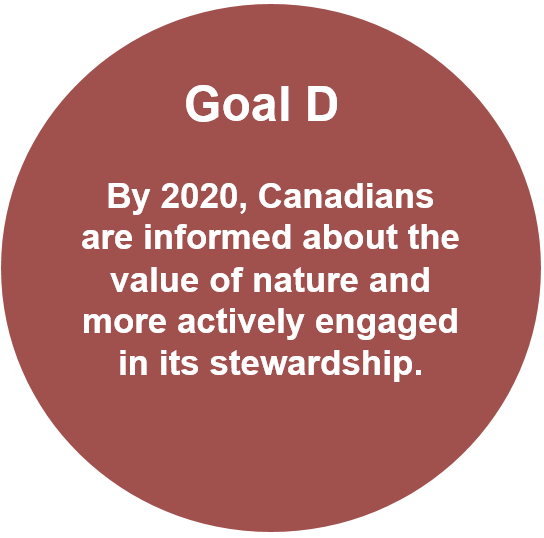Canada Target 18. By 2020, biodiversity is integrated into the elementary and secondary school curricula
About the Target
Catalyzing the next generation of conservation leaders requires educating young people about biodiversity, including its importance to human health and well-being, and what can be done to conserve and use it more sustainably. Mainstreaming an understanding of the importance of biodiversity can help create a culture of appreciation, conservation, and action over time.
This target focuses on a key avenue for teaching Canada’s young people about biodiversity: integrating biodiversity into formal education systems. Incorporating biodiversity education into provincial and territorial curriculum – through science, art, physical education, and other subjects – can be complemented by partnerships with Canadian zoos, aquariums, museums, outdoor education centres and conservation organizations.
Canada Target 18 is linked with the following global Aichi target under the United Nations Convention on Biological Diversity Strategic Plan for Biodiversity 2011-2020:
Aichi Target 1 - By 2020, at the latest, people are aware of the values of biodiversity and the steps they can take to conserve and use it sustainably.
2020 Final Assessment
All ten of the provinces and territories that participated in a 2018 survey reported that biodiversity values have been incorporated into elementary and secondary school curricula. Since then, a supplementary search showed that two additional jurisdictions have integrated biodiversity and key ideas and concepts into curriculum documents across grades.
The target has been met given that the very large majority of educational curricula in Canada is known to include a breadth of biodiversity concepts. The indicator and assessment do not, however, include a review of effectiveness. Further work in this area is still important.
Contributing Actions
Earth Rangers is a kids’ conservation organization, dedicated to educating children and their families about biodiversity, inspiring them to adopt sustainable behaviours, and empowering them to become directly involved in protecting animals and their habitats. In 2020, the program launched an app that provides an immersive and educational digital experience for members.
In Ontario, the Biodiversity Education and Awareness Network (BEAN) is a collaboration of governmental and non-governmental organizations. BEAN connects scientists and organizations with teachers, parents, and students to provide education and resources to recover and prevent biodiversity-loss in the province. The website includes ongoing articles describing and linking to resources across Ontario and Canada.
The Resources for Rethinking (R4R) database is an initiative of Learning for a Sustainable Future and aims to encourage teachers and students to explore sustainable development themes and concepts in their classrooms. R4R also acts as a portal and connects to more than one thousand classroom-ready materials from a variety of sources. The resources examine the environmental, social and economic aspects of sustainability issues through action-oriented, interdisciplinary learning.
To be included in the database, resources must meet stringent sustainability and pedagogical criteria recommended in the research on teaching and learning. An emphasis is placed on identifying classroom materials that promote action projects through which students can effect positive change within their communities.
Each resource included in the database has been reviewed by an experienced classroom practitioner and matched specifically to relevant curriculum outcomes in all provinces and territories. This allows teachers from across Canada to search for relevant materials by province, grade, subject and theme, and to use a sustainable development lens for many of the topics and concepts they are currently responsible for teaching.

